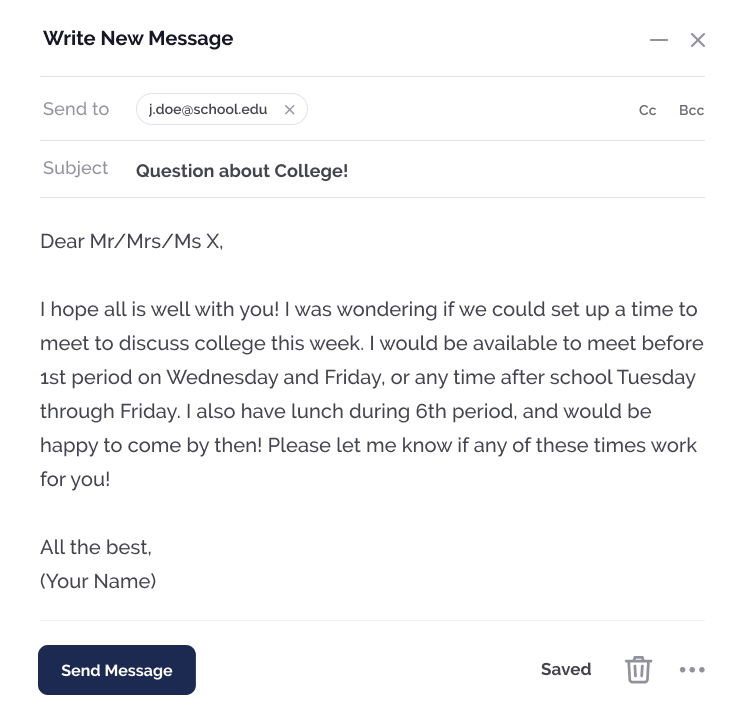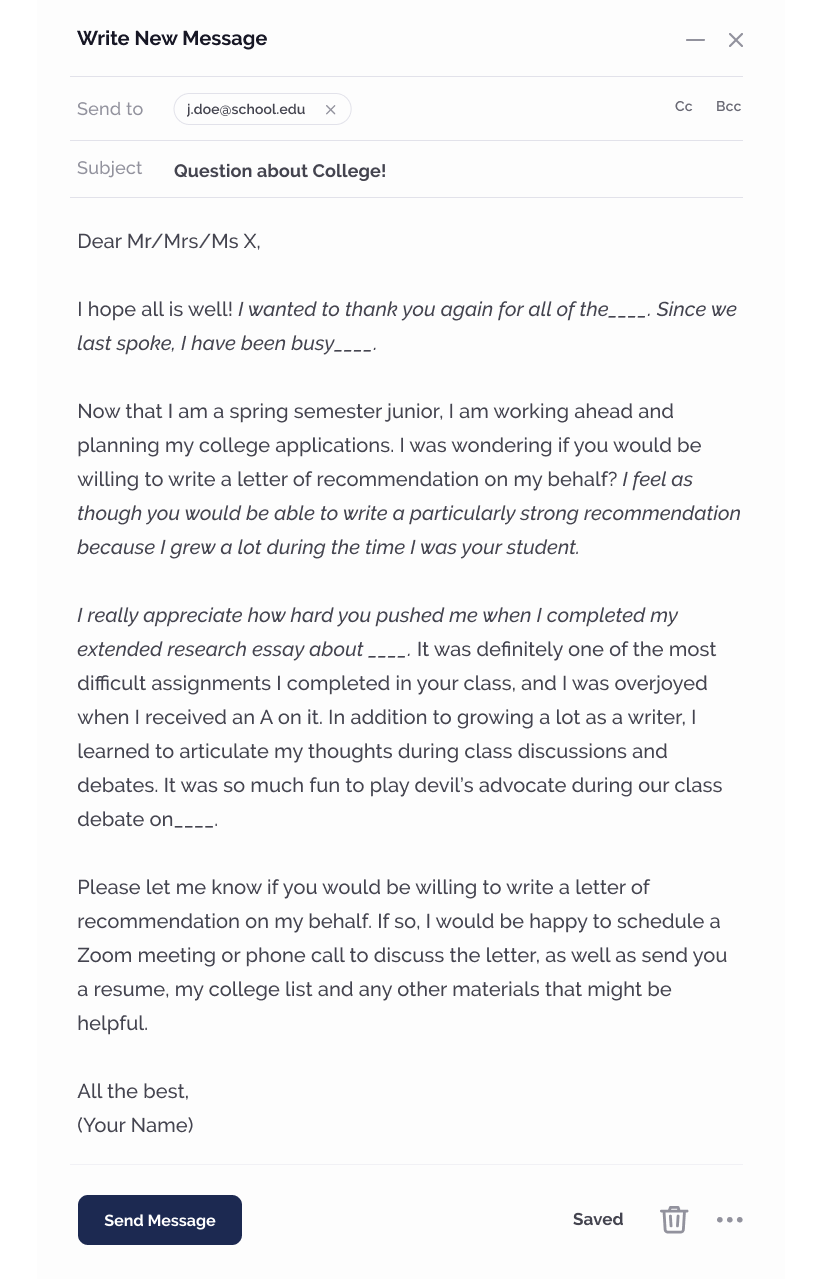Acing standardized tests, writing a compelling personal statement and supplements, and maintaining a high GPA are all challenging tasks, but at least you have the comfort of having control over these critical components of your college application. A letter of recommendation, on the other hand, requires you to trust a teacher or advisor to advocate for you and help you get into your top choice universities. Because of the unique nature of the letter, we’ve put together a list of the things you need to consider when you ask someone to write your letter of recommendation.
Why you should ask for a letter of recommendation
The letter of recommendation is an integral part of the college application for a reason. Much like your personal statement, a recommendation letter provides more insight into the person behind the application. In a way, your letters of recommendation provide an even better picture of you, because they allow your prospective colleges to see you through the eyes of a trusted teacher, counselor, or mentor.
These individuals can speak to your best qualities as a student and as a person: Do you work hard to improve your grades when you struggle with a particular unit? Crack a joke when your teammate seems upset about losing a game? Hold the door open for your peers? Lend a helping hand to your confused classmate struggling through a problem set? These are all questions a good recommender can answer in a strong letter of recommendation.
KEY TIP
Aside from the fact that most college applications will require you to provide one or more letters of recommendation, asking for letters of recommendation is a great way to practice skills of self-advocacy, time-management, and even humility.
Who to Ask for a Letter of Recommendation
Perhaps the most important question you’ll ask yourself is who to ask for a letter of recommendation. Depending on the schools to which you’re applying, you may need three or more different recommenders:
- NCounselor
- NTeacher
- N"Other" Recommender
The first two are pretty self-explanatory; you can choose any teacher and counselor at your school, but don’t ask just anyone. You should choose a teacher who knows you well and who you believe will put time and effort into writing a recommendation letter that reflects your unique personality and skill set. Choosing a teacher who also advises an extracurricular activity you’re in or a teacher you’ve known since sophomore year can help ensure you have a meaningful connection. Choosing a teacher who can speak to your passion for a specific field, particularly if it’s one you plan to study in college, can also be a good move.
Some schools have specific recommendations for who you should ask to write letters on your behalf if you want to apply to their programs, so be sure to research each school’s specific requirements. Here’s an example from MIT.
“MIT requires two letters of recommendation from teachers. One recommendation should be from a math or science teacher, and one should be from a humanities, social science, or language teacher, although this is not a hard requirement.” – MIT Admissions
Though it’s not a hard requirement, it’s a good idea to demonstrate your strengths in STEM if you’re planning to apply to a STEM major.
The third category, “Other Recommender” might be a little more confusing. Commonapp.org describes “Other Recommenders” as “Arts Teacher, Clergy, Coach, College Access Counselor, Employer, Family Member, Peer, [or] Other.”
As you know, with freedom comes responsibility, so you should be extra scrutinizing when you select your outside recommender. This recommendation letter is a chance to reveal much more than what your test scores and transcripts disclose about you; choose a recommender who understands your character, interests, and potential, and who will be able to relay that to your college admissions officer. For all of your letter writers, you should ideally choose someone who has known you for multiple semesters and can provide honest and unique insight into who you are as a person.
KEY TIP
Think strategically about how your recommendation letters can strengthen your application as a whole. While many students assume that the best recommendations come from teachers whose courses they have aced, this is not necessarily the case.
If you have established through your extracurriculars and transcripts that you are a particularly strong science student, but you have scored lower in English courses, you might choose an English teacher who knows you well to attest to the progress you’ve made, the hard work you put in to improve your writing, and the dedication you had to learning the material.
All of these things are not apparent in a numerical score or letter grade, and having a teacher attest to those qualities can make even the weaker points in your application look more like strengths.
When to ask for a letter of recommendation
Since many colleges and universities have different deadlines, and early action and early decision applications complicate this even further, there’s no single date by which you should request a letter of recommendation. In general though, we recommend asking your recommenders for a letter in the late spring of your junior year, and at minimum, at least two months before the submission deadline. This will give your letter writers plenty of time to review your resume, write the letter, and tackle any technical issues they might encounter during the submission process.
In the words of the Common App, “The more advance notice you give, the more time they have to craft a well-written letter.”
Keep in mind that you can submit your application through The Common App before your recommenders submit their letters. That means you can’t use your teachers’ potential procrastination as an excuse for your own. Getting your application in early means less stress, so make sure you stay proactive about submitting all of your materials ahead of time and check in with your teachers to ensure they submit your letters on time.
How to ask a teacher, internship supervisor or coach for a letter of recommendation over email
Between school and sports practice or your many other extracurricular involvements, it might not be possible for you to meet with your recommender in person. Or, you might be reaching out to someone you interned for over the summer or whose team you no longer play on, and no longer see day to day. If that is the case, you can definitely send your request for a letter of recommendation over email.
Asking for a letter of recommendation from a coach will be slightly different from asking for a letter of recommendation from a teacher, employer or internship supervisor. Here are examples you can use for guidance as you draft your own emails.
How to ask for a Letter of Recommendation
Unless you’ve applied for competitive internships or summer programs before, you might not have had the chance to learn the etiquette for asking for a recommendation letter. The first thing to bear in mind is that, as awkward and new as this feels for you, your teacher has likely written dozens of letters of recommendation for other students over the years. They already know the drill, so let that give you comfort if you have been working yourself up about asking them. Plus, if you’re asking someone who already has a strong personal connection with you, they want the best for your future and are eager to help you achieve the goals you’ve set your sights on!
If you are asking a current teacher, you should ask them privately after class or during an extra help session. If you plan to ask a teacher whose class you aren’t currently in, you can stop by their classroom in between classes, before or after school, or write them an email asking them to meet.
Below is an example of an email you could send.
Example Email
asking to set a meeting
Hover over the hotspots to view tips and details.


Make sure to be flexible with your own schedule to accommodate theirs.
Top 4 Must-Haves
to prepare before your letter of recommendation meeting
You should approach your teacher in a one-on-one setting when asking for a letter of recommendation. Here are four things you should prepare in advance of the meeting.
You want to provide as much context as possible so they can tailor the letter toward your application or help complement what you include in your application. You should also ask them if they’d like you to provide any additional information that might aid them in the process.
Some teachers will ask students to complete a letter of recommendation questionnaire, while others prefer to schedule a meeting to discuss students’ accomplishments, goals and future plans in person or over Zoom.
The Why
Resume
Goals List
Schools List
The list of schools you’re considering applying to
How to ask a teacher, internship supervisor or coach for a letter of recommendation over email
Between school and sports practice or your many other extracurricular involvements, it might not be possible for you to meet with your recommender in person. Or, you might be reaching out to someone you interned for over the summer or whose team you no longer play on, and no longer see day to day. If that is the case, you can definitely send your request for a letter of recommendation over email.
Asking for a letter of recommendation from a coach will be slightly different from asking for a letter of recommendation from a teacher, employer or internship supervisor. Here are examples you can use for guidance as you draft your own emails.
Example Email
asking a teacher
Hover over the hotspots to view tips and details.


Insert update and/or note of gratitude here

Provide reasons as to why you think they would be able to write a strong letter on your behalf

Then, you will want to add a specific anecdote about a project or assignment you are particularly proud of.
How to ask a research supervisor for a letter of recommendation over email
If you completed a research internship at any point during your high school career, you might consider asking your internship supervisor to write your third letter of recommendation. An internship supervisor can likely speak to your interest in a field or research topic, your work ethic, and your ability to be resourceful as you seek answers to your questions, among other things. They can also write about your capstone project or final research presentation, if you completed your internship with either.
To: Mr/Mrs/Ms X
From: You
Subject: Question about College!
Dear Mr/Mrs/Ms X,
I hope all is well! I wanted to reiterate how much I enjoyed interning for you this past summer. Since August, I have been continuing to explore my interest in neuroscience by taking Cognitive Neuroscience at my local university. I am also working to complete my Junior Research Paper about advances in Alzheimer’s research.
I have also been preparing to complete my college applications over the next few months. I was wondering if you would be willing to write a letter of recommendation on my behalf. I feel as though you could write a strong letter of recommendation for me because I grew a lot as a student and researcher during my time interning for you.
I was particularly proud of the final presentation I gave about my summer research during our lab meeting in August, and of the presentation I gave at the High School Research Symposium the following week. Completing my summer internship was particularly challenging at times, especially when I felt I lacked the biochemistry knowledge needed to understand certain molecular pathways and reactions relevant to our research, but putting in the extra time needed to understand them was particularly rewarding. Thank you again for all of your guidance and for answering all of my questions.
If you would be willing to write a letter of recommendation on my behalf, I would love to schedule a Zoom meeting or phone call to catch up, discuss the letter and to answer any questions you might have. I would also be happy to send you my resume and college list, or any other materials that might be helpful!
All the best,
Your Name
How to ask a coach for a letter of recommendation over email
While your teacher can speak to your qualities in the classroom, a coach can speak to your qualities on and off the field. A coach can tell your admissions officers about your dedication to your sport, your ability to collaborate and communicate with your teammates, or to lead your team through a difficult game or scrimmage.
To: Mr/Mrs/Ms X
From: You
Subject: Question about College!
Dear Coach ______,
I hope all is well and that you’ve been enjoying your free time in the off-season!
In addition to obsessively watching collegiate tennis, I have spent the last few months competing with the school’s soccer team during the spring season. We recently placed ___ in the ___ tournament, and I believe the technical skills, conditioning, and mental fortitude that you helped me build during the tennis season have been invaluable on the soccer field this spring.
As I look towards the summer, I am beginning to prepare for my college applications in the fall. I know our pre-season will begin in a few months’ time, but I wanted to reach out now to ask if you would be willing to write a letter of recommendation on my behalf.
I think you would be able to write a strong letter on my behalf because you have been there to support my growth as a player, as a leader, and as a person over the last ____ years. I have really enjoyed leading our team in warm-ups, organizing competition logistics and of course, our team dinners as a junior captain. Being a part of this team has been the highlight of my high school experience, and I can’t wait to see what our final season together will bring.
If you would be willing to write a letter of recommendation on my behalf, I would love to schedule a Zoom meeting or phone call to catch up, discuss the letter, and answer any questions you might have. I would also be happy to send you my resume and college list!
All the best,
Your Name
How to Submit Your Letters of Recommendation Through the Common App
The step-by-step process of submitting your recommendation letter through the Common App will look something like this:
Select the people you want to submit a letter of rec on your behalf, and ask them following the advice outlined above. Send them your resume, college list and other information about you to give them more context.
After August 1st, log into the Common Application website, and add your recommenders to your “Invite and Manage Recommenders” list.
Go to the Recommenders and FERPA section of one of your schools in the My Colleges tab. Before you can assign your recommender(s), you’ll need to complete the Family Educational Rights and Privacy Act (FERPA) release authorization process. We recommend waiving your rights.
Then, you can assign your recommender(s) to each school you are applying to. By assigning recommenders, you are notifying the Common App which letters you want to be sent to which school on your list. Make sure to meet each of your school’s specific requirements regarding letters of recommendation as you choose which letters are sent to which school. Some schools allow three letters while others only allow two, so be sure to double check each school’s policy on their admissions website.
Your recommenders will be invited to submit their letter of recommendation online (either through Common App or Naviance eDocs, depending on the school).
Check in online periodically. If the submission deadline is drawing near and your recommenders haven’t yet submitted their letters, check in with each one.
Be patient with your recommenders throughout this process. Once they have submitted your letter, be sure to take the time to write them a handwritten note thanking them for writing your letter of recommendation! Once you start hearing from colleges, keep them updated with your success stories, as they will want the chance to congratulate you!
For more guidance on how to assign your recommenders on the Common Application, read this.
Frequently Asked Questions
How should I thank my teacher for writing my letter of recommendation?
One of the best ways to say thank you and express your appreciation for a teacher or other recommender is by giving them a handwritten card. You should write your note in your own voice, genuinely and thoughtfully expressing how they have supported you in your academic and/or personal journey. Avoid using platitudes like “you are the best teacher in the world,” and instead, write a note that conveys their unique contribution to your growth. You can write about fond memories and stand out events you’ve shared with the teacher in or outside of their class. Even as you express your thanks in writing, you should also make an effort to verbalize your gratitude in person when you give them your letter. Spark a conversation, thank them for advocating for your candidacy, and let them know you will keep them in the loop about your college decisions.
Are letters of recommendation important?
Yes, letters of recommendation are an essential component of the college admissions process. They provide valuable insights into a student's character, academic abilities, and personal qualities from the perspective of teachers, counselors, or mentors. Strong letters of recommendation can positively influence an applicant's chances of acceptance, highlighting their strengths and potential for contributing to their future campus communities.
Why are letters of recommendation important to colleges?
Admissions officers use letters of recommendation to gain a holistic understanding of applicants and assess their suitability for admission to their institution. Letters of recommendation speak to the qualities of a student that are not encapsulated in their “on-paper” materials and provide a third-party perspective on a student’s candidacy.
Are letters of recommendation confidential?
Yes, letters of recommendation are typically confidential documents. While students are given the option to waive or not to waive their right to access their letters of recommendation (the FERPA Waiver on the Common App), it is typically encouraged that students waive this right. Admissions officers expect recommenders to provide candid and honest assessments of students' abilities and character without fear of repercussions or influence from the student or the student’s family. Confidentiality ensures the integrity and authenticity of the recommendation process, allowing recommenders to provide genuine and unbiased evaluations.
How do recommenders submit letters of recommendation?
Recommenders will send their letters to counselors, upload them to Naviance or the Common App, or send them directly to the colleges or universities electronically or via mail.
Can letters of recommendation be sent before or after an application?
It is essential for students to check the specific requirements and deadlines set by each institution to which they are applying and communicate deadlines to their recommenders to ensure that their letters of recommendation are submitted on time. Do not worry if your recommender sends your letter before you send in your other application materials. If letters are submitted before students’ applications, they will be stored in students’ files for safekeeping until applications are complete and ready for review. On the other hand, while some colleges may allow recommenders to submit letters after the application deadline, not all do, so it is best to adhere to the designated timeline to avoid any delays or complications in the admissions process.
Can letters of recommendation be from anyone?
Depending on the schools to which you’re applying, you may need three or more different letters of recommendation from a teacher, a school counselor, and one other recommender, such as a mentor, employer, or coach who has had significant interactions with you and can speak to your strengths and accomplishments. Students should be diligent in checking each school’s requirements for recommendations before requesting their letters.



